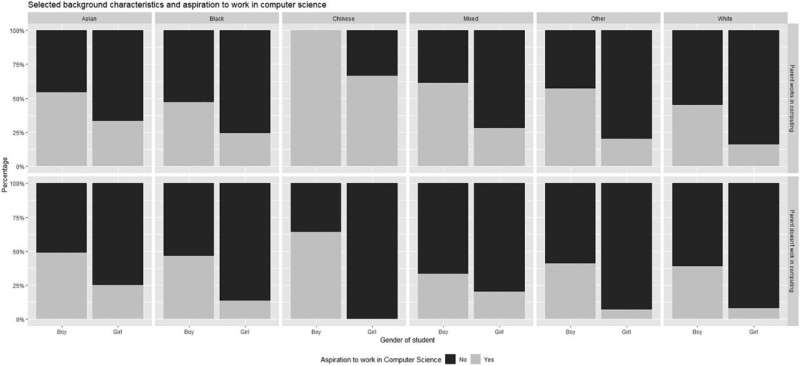This article has been reviewed according to Science X's editorial process and policies. Editors have highlighted the following attributes while ensuring the content's credibility:
fact-checked
trusted source
proofread
Equity in computer science impossible without review of curriculum, say researchers

England's girls and other underrepresented groups are at risk of being failed by the current computing curriculum, which excludes their interests, according to new research published recently.
A study by University of Reading, in partnership with Kings College London, published in the International Journal of Science Education, found the current school system creates a gender imbalance in computer science that is reflected in the workplace. The solution, they say, could be to revamp the curriculum to include more creative aspects, such as developing students' skills in digital art, to increase interest and engagement in computer science while also equipping them with valuable skills for the future workforce.
Researchers analyzed questionnaire data from 4,983 secondary school students in England and found that among those who chose to study GCSE Computer Science, girls were 42% less likely to aspire to be a computer scientist compared to boys.
Dr. Billy Wong, Associate Professor at the University of Reading and co-investigator, said, "Given there is high demand for computing graduates in the workplace, it is worrying to see that girls and other marginalized groups are being put-off from thinking about being a computer scientist."
"Students are not a homogenous group, and our observations suggest that the current computing curriculum may not be aligned with the diverse interests, aspirations and backgrounds of young people."
The current GCSE has a strong emphasis on technical skills, especially coding. However, many young people said they cannot see themselves in a future career involving only these skills.
Experts propose that a reform of the GCSE qualification and the wider curriculum, along with other strategies such as encouraging parental support, could help achieve greater gender parity in computing.
Principal investigator Dr. Peter Kemp, Senior Lecturer in Computing Education at King's College London, said, "There is no doubt that computer science is valuable for individual, national and global prosperity," he said. "However, when these findings are viewed with the knowledge of the current gender imbalance in computer science, from school to the workplace, this should be of concern for us all."
"While digital skills are increasingly important for future jobs and the economy, the current GCSE is focused on computer science and developing programming skills, and this seems to deter some young people, in particular girls, from taking up the subject."
The research team suggests that broadening the GCSE and the curriculum to include practices that use digital technology as part of the creative process, would appeal to more students who want to develop digital skills for their future careers but do not see the relevance of the current curriculum and GCSE Computer Science.
Dr. Jessica Hamer, Research Associate at King's College London, and co-investigator, said, "This research is shedding much-needed light on a phenomenon that we knew existed but have so far failed to address adequately—the uptake of girls in secondary school level computing in England. We hope it will lead to more evidence-based policies and practices, which will eventually enable more young people to see digital jobs as a possibility for them."
As well as examining differences in gender, the researchers also considered the impact that other non-demographic characteristics may have on a child's aspiration to become a computer scientist. For example, if the student has family support and a positive view of people who work in computer science, the study shows they are more likely to want to pursue a career in the field.
More information: Jessica M. M. Hamer et al, Who wants to be a computer scientist? The computing aspirations of students in English secondary schools, International Journal of Science Education (2023). DOI: 10.1080/09500693.2023.2179379
Provided by University of Reading





















